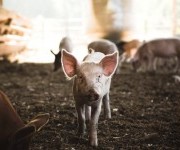Photo: Charles LavoieThanks to the success of Super Size Me and Food, Inc., public awareness of the environmental and health impacts of the U.S. industrial meat system is growing steadily. Adding to the growing chorus calling for change is American Meat, a new documentary that director Graham Meriwether says is “dedicated to the American farmer.” Meriwether’s film follows Joel Salatin, a pasture-based farmer featured in Michael Pollan’s The Omnivore’s Dilemma, and looks at the lives of dozens of other farmers across the country producing both industrially and sustainably raised meat. Meriwether’s film aims to spark conversation about our food system, and he hopes to inspire respect for all U.S. farmers. “If you watch our film, you’ll walk away feeling like, ‘Maybe I should be a farmer, too,'” he says.
American Meat opened in Virginia and screened in Iowa; over the next few months Meriwether will travel across the country to host screenings in partnership with local food groups. “We’re looking to change the experience of going to the movies to something community-based where you share a meal with a group of people, and then have a conversation with the person next to you,” he says. (You can go to the film’s website to request a screening in your area.)
We chatted with Meriwether about some of the issues American Meat explores.
Q. How does American Meat carry on the conversation that Omnivore’s Dilemma and Food, Inc. started?
A. Our film is very much about the struggle that farmers face. Food, Inc. did a great job of talking about some of the ethical and moral issues of meat production and animal husbandry in America. We actually introduce you to the farmers on both sides, the commodity farmers and the pasture-based farmers, and we show you the challenges they face and the joys they share. Our film is not a polemic; it’s not an expose. When you watch it you’ll empathize with everyone in the film.
Q. What are some of the challenges that commodity farmers face as opposed to smaller-scale farmers?
A. One of them is the cost of feed, [which] is directly related to the cost of oil. In 2008 a lot of farmers went out of business because of the price of oil. That actually led to the bankruptcy of the nation’s largest chicken producer, Pilgrim’s Pride, and to a 20 percent contraction in the nation’s largest pork producer, Smithfield. It became so expensive to import [meat] from the U.S. that Russia and China stopped importing chicken and pork. Exports are about 20 percent of the U.S. meat industry, so there was a glut on the meat market because all this meat wasn’t being shipped off, and that pushed the price even further down. It was a doomsday scenario for a little while. [Also], commodity farmers get into these contracts with large vertical integrators, and when the vertical integrators pull out of the contract, then they’re stuck with a lot of debt. They borrow all this money to build the chicken and hog houses, and that ends up getting them trapped in this cycle of dependency.
The average farmer in the industrial model gets eight cents of every dollar that’s spent at the grocery store, whereas if you’re a farmer that’s selling your own product, you keep 100 cents of every dollar. So you have a lot more financial independence — you’re able to charge a premium for your products.
But [commodity farmers] also have a lot of joys. They’re doing what they need to do to keep their family farm going. They enjoy the independence of living on their own land and working with their hands and working outside.
Joel Salatin on his farm.Photo: Charles LavoieQ. Had any of the commodity farmers you talked to considered switching to smaller-scale or organic production? How attractive or feasible would that be for them?
A. Chuck Wirtz, an Iowa farmer, actually converts a portion of his operation over to organic production — or tries to — and we document the challenges that he goes through. Whole Foods pulled his contract at the last moment, because the economy was tanking and they didn’t think there was going to be enough of a market for [Wirtz’ pork]. But the good news is the demand for pasture-based and organic meat is always growing, so I think it’s only a matter of time before Chuck can find a contract.
[Ed. note: Wirtz never had a contract directly with Whole Foods, but his meat was supposed to end up there eventually, until the economy tanked and the growth of the organic pork production model lost its momentum. Wirtz later began providing pork for Niman Ranch.]
The reason why a lot of commodity farmers would want to transition isn’t for moral or ethical reasons, but because organic production actually creates more jobs because it’s more labor-intensive [than industrial agriculture]. That allows for the next generation to stay on the farm.
Q. Your film explores the question of whether small-scale, sustainable farming can ever feed America. Do you think it can?
A. Yeah, I do. It’s not going to be easy, though. If we want to continue to eat the same amount of chicken, pork, and beef, then we’re going to need 4 million farmers farming [sustainably]. It might be a perfect match, because with our economy losing jobs every day, and this growing market for organic, grass-fed meat — there you go, there’s some jobs. If there are young people who want to get into this, there’s a huge market that’s growing every day. There’s a confluence of factors that can make this work.
One of the exciting stories we talk about in our film is that Joel Salatin starts producing pork for the Charlottesville, Va. and Harrisonburg, Va. Chipotles, and that’s creating a bunch of jobs in the Virginia economy. They’re setting up a template so that they can start to do that in every Chipotle, and you start to use your imagination: That’s thousands and thousands of jobs right there. It’s up to us, the American people, to create a demand and a need for this type of grass-based meat and organic meat.
Q. To a lot of consumers, grass-fed meat and organic food in general are too expensive or carry a stigma of foodie elitism. How can sustainably raised meat be made more accessible?
A. Joel’s pork is usually in the most expensive restaurants in Washington, D.C. and Virginia. [Now] you can get it for five or six bucks in a burrito at Chipotle. So right there, that’s an affordable meal. The other answer is, if this continues to grow as exponentially as it is, then there’s going to be more and more of it produced, which is going to bring down the price. It takes a little research on the part of the person that wants to find this stuff, but right now you can get grocery-store prices on pasture-based meat, you just have to join a buying club or a CSA. But hopefully in the not-too-distant future it’ll be in grocery stores and it’ll be competing with the commodity meat.
The other big issue is right now the industrial model gets $15 billion in subsidies. We need to shift government money from industrial agriculture to local, small, grass-based, and organic farms. With Food Democracy Now, one
of our outreach partners, we’re put[ting] together a petition to shift $5 billion in subsidies over to local distribution methods and sustainable farms.
Q. How is the growth of the sustainable food movement changing popular attitudes toward farmers?
A. U.S. farmers have really been nothing but villainized for a long time, and that’s stopping with our film. We’re celebrating the work of all farmers. The reason we have the industrial model is not because somebody hatched up a scheme — it’s ultimately because it’s the system we wanted. We wanted to have food as cheaply as possible. U.S. farmers have done an incredible job of delivering on that promise. But right now the model isn’t working, because it’s forcing the next generation off of farms, and it’s also creating food that in a lot of cases is overly processed and not healthy. The pendulum has swung way too far in this one direction of mechanization and industrialization, and the pendulum has to swing back. The farmers haven’t failed us, the system has failed us, and it’s time for us to change.
Today we face more challenges as a culture than I think we’ve ever faced, and we don’t have time to point fingers. We have to work together — commodity farmers, grass-based farmers, chefs, everyday people — we all have to work together and change our food system.
Watch the trailer:



